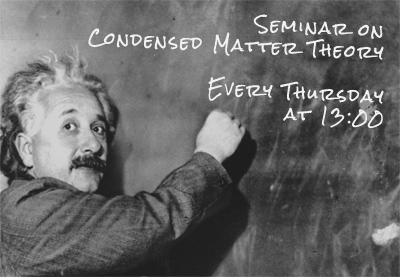Seminar on Condensed Matter Theory
Group of Theoretical Physics at the Department of Condensed Matter Physics
of Charles University has a pleasure to invite you to attend the seminar
on 11th April 2024 at 14:00
at Faculty of Mathematics and Physics of Charles University, Ke Karlovu 5, 121 16 Praha 2
Seminar room F 052
prof. Mark A. Novotny
Department of Physics & Astronomy at Mississippi State University
Unanticipated coherent electron transport properties in disordered nanodevices: order-amidst-disorder, quantum dragons, tatty nanosystems, and universal scaling
prof. Mark A. Novotny » Unanticipated coherent electron transport properties in disordered nanodevices: order-amidst-disorder, quantum dragons, tatty nanosystems, and universal scaling
Department of Physics & Astronomy at Mississippi State University
Location: Lecture room F2 First floor, Ke Karlovu 5
The standard short-ranged single-orbital tight binding model, analyzed using standard NEGF (Non-Equilibrium Green’s Function) methods, is used to study electron transport in unconventional disordered 2D, 3D, and 2D+3D nanodevices. The model and methods are the same as are used to study ballistic electron propagation in the ordered systems of metallic carbon nanotubes and graphene nanoribbons. For ballistic electron transport, the transmission probability T(E)=1 for all injected electron energies E that propagate through attached thin leads. Quantum dragon nanodevices, and nanodevices that are almost quantum dragons, are studied. A quantum dragon nanodevice [1] has T(E)=1 for all E, even though the device may have strong disorder in the tight binding parameters. Quantum dragon nanodevices may exhibit order-amidst-disorder [2], where the Hamiltonian is strongly disordered but commonly measured quantities such as bond currents and the projected local density of states (LDOS) are ordered. Starting from a thin 2D nano-ribbon and using allowed operations of cutting, twisting, sewing, and braiding can give very tatty quantum dragon nanodevices. We derive and demonstrate two different regimes of universal scaling for all nanodevices that are almost quantum dragon nanodevices.
[1] M.A. Novotny, Phys. Rev B 90, 165103 (2014).
[2] M.A. Novotny, G. Inkoom, and T. Novotný, EuroPhysics Lett. 143, 26005 (2023).


